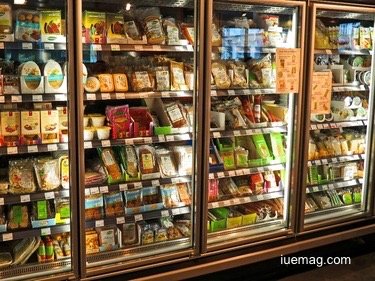

Who are Commercial Refrigeration Mechanics And Why are they Important
 Commercial refrigeration mechanics specialize in installing, maintaining, and repairing refrigeration systems used in commercial settings like grocery stores, restaurants, warehouses, and hospitals.
Commercial refrigeration mechanics specialize in installing, maintaining, and repairing refrigeration systems used in commercial settings like grocery stores, restaurants, warehouses, and hospitals. As per experts like JD Refrigeration these complex systems are vital for preserving food, medicines, and other perishable items. Without proper refrigeration, businesses couldn't function, people could get sick from spoiled food, and there would be immense waste.
Types of Commercial Refrigeration Systems
Commercial facilities rely on different types of refrigeration systems based on their needs. Common systems include walk-in coolers, refrigerated display cases, and industrial-scale freezer warehouses. Each has different components but uses refrigerants and compressors to remove heat.
Common Components
All systems contain an evaporator coil, condenser coil, compressor, expansion valve, fans, and refrigerant lines. Sensors and control panels also regulate temperatures, defrost cycles, and alarms. Proper installation is critical.
How Do They Work?
Refrigerant absorbs heat as it evaporates inside the evaporator coil, cooling the surrounding air or items. The compressor pumps the refrigerant to the condenser coil where heat releases as the refrigerant condenses back to liquid. The process repeats in a continuous loop, transferring heat outside and maintaining set temperatures inside.
Who are Commercial Refrigeration Mechanics?
Commercial refrigeration mechanics install, service, troubleshoot, and repair commercial refrigeration systems and all their electrical and mechanical components. Their expertise keeps food, medicine, and products safely chilled in warehouses, kitchens, factories, and displays.
Responsibilities
Mechanics handle a wide range of critical responsibilities including:
- Installing new refrigeration units
- Conducting preventative maintenance
- Performing emergency repairs
- Replacing old parts
- Upgrading outdated equipment
- Adjusting refrigerant charge levels
- Documenting work details
Skills and Training Needed
The job requires technical aptitude, physical capability, and continuous learning. Most have an associate degree in refrigeration or HVAC technology. Licenses for handling refrigerants are also compulsory. On-going training is essential with frequent regulatory and technological advancements.
Why Commercial Refrigeration Mechanics Are Important
Well-trained refrigeration mechanics are invaluable for several crucial reasons:
1. Keep Food Safe
Faulty refrigeration jeopardizes food safety, risking the health of customers and costly food losses. Mechanics ensure systems maintain constant temperatures to prevent bacterial growth.
2. Reduce Waste
A unit failure can ruin refrigerated inventory. Swift repairs by qualified technicians prevent thousands of wasted products. Proper refrigerant levels also maximize efficiency, using less electricity.
3. Maintain Proper Storage Conditions
Specific products require defined conditions like some pharmaceuticals needing strict climate control. Mechanics enable precise temperature and humidity regulation.
4. Keep Businesses Operational
Core business functions depend on refrigeration running smoothly and reliably.
- Grocery Stores
Grocery stores would grind to a halt without functioning display cases and coolers. Skilled refrigeration pros enable uninterrupted food retailing.
- Restaurants
Commercial kitchens rely on walk-in coolers and freezers to prep ingredients in advance. Refrigeration repairs must be expedient so restaurants can continuously serve customers.
5. Advance Sustainability Efforts
Updating old refrigeration systems with eco-friendly designs can significantly reduce environmental impact. Mechanics facilitate the transition with proper installation and maintenance.
What Education is Required for Commercial Refrigeration Mechanics?
Most positions require an associate degree in refrigeration technology or HVAC technology from an accredited trade school or community college. Coursework covers equipment, safety, blueprint reading, and troubleshooting.
Do They Only Work on Refrigerators?
No. Their expertise applies to any cooling system using refrigerant compression including display cases, vending machines, walk-in freezers, chilled water systems, ice machines, and transport refrigeration.Conclusion
Commercial refrigeration mechanics powerfully influence public health, food supplies, consumerism, and green technology through their specialized trade. As systems expand in scale and complexity, these behind-the-scenes experts remain indispensable.
Copyrights © 2026 Inspiration Unlimited - iU - Online Global Positivity Media
Any facts, figures or references stated here are made by the author & don't reflect the endorsement of iU at all times unless otherwise drafted by official staff at iU. A part [small/large] could be AI generated content at times and it's inevitable today. If you have a feedback particularly with regards to that, feel free to let us know. This article was first published here on 28th November 2023.
Want to Publish About Your Business / Achievements
Let's Discuss Right Away!

All chats are end-to-end encrypted by WhatsApp and won't be shared anywhere [won't be stored either].

